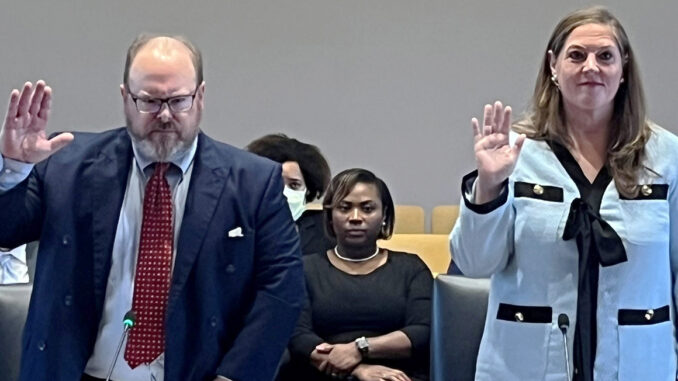
RALEIGH — In a recent House Oversight and Reform Committee hearing, the head of the North Carolina Department of Motor Vehicles faced tough questions from lawmakers regarding the agency’s compliance with state laws.
Testifying under oath before the committee were North Carolina Department of Motor Vehicles (NCDMV) Commissioner Wayne Goodwin and the representative of the agency’s vendor, Lisa Shoemaker, vice president of Global Corporate Relations for Idemia North America.
“Other than the recent credentials production and delivery delay, by every other general metric of which I’m aware DMV is better now than it was two years ago,” Goodwin said in his opening statement. He added that the state’s newly designed driver’s licenses “will have the most secure credential in our great state’s history,” and the “new licenses and IDs will be among the most secure identifying documents in the world.”
The hearing, held on June 6, centered on a software glitch that resulted in 2,136 customers improperly renewing their licenses between Feb.15-20, leading to a subsequent backlog of more than 350,000 licenses. The backlog caused some residents to have up to a two-month wait to get their licenses.
After opening statements, finger-pointing ensued between Goodwin and Shoemaker over who was responsible for the decision to retrieve the improperly issued licenses from some 33,000 already printed cards. That process halted production from Feb. 20 until March 4 and contributed to the massive backlog.
According to Goodwin, Idemia was already seven days behind schedule before production was halted, and he claimed Idemia provided conflicting information about the backlog timeframe and has not clearly explained why the delay grew to 6-8 weeks.
Shoemaker told lawmakers Idemia submitted various overtime scenarios and costs. She said the NCDMV misled Idemia about a request for proposal process for a new contract, when in fact the agency was already negotiating with a new vendor.
Among the issues raised with the backlog was voting access for citizens needing photo IDs for voting in the March and May elections.
Despite their disagreements, Goodwin and Shoemaker agreed Idemia would clear the backlog by June 30. To achieve this, Shoemaker said Idemia has expanded production beyond its Sacramento, California, plant to include its Springfield, Illinois, facility starting May 13.
However, this solution raised legal questions among committee members.
Committee Chair Harry Warren (R-Rowan) questioned the NCDMV’s interpretation of “central location,” citing a May 6 letter from Goodwin to the General Assembly which stated, “As you know, the Division of Motor Vehicles is required to have all credentials produced and issued from a central location.”
Rep. George Cleveland (R-Onslow) accused the NCDMV of selectively interpreting the law to solve a problem.
“When Idemia opened another facility, they broke our state law, and you, I understand, did nothing about this,” Cleveland said to Goodwin.
Goodwin argued that “central location” could mean “one company.”
Rep. Allen Chesser (R-Nash) pointed out the NCDMV signed a contract conflicting a state law that requires a color photo on licenses, leading to a 13% price increase per card (from $2.55 to $2.91) and a $3 million equipment purchase to add a small color photo on the back of licenses.
Goodwin and Chesser exchanged comments regarding the interpretation of statutes, with Warren telling Goodwin, “The department seems to have a pattern of interpreting statute as it best fits your need.”
Rep. Cleveland (R-Onslow) was a bit more forceful, telling Goodwin, “The law is very clear. And if you want to circumvent the law, legal counsel is a good way to go.”
The NCDMV’s challenges don’t end with the current backlog. Idemia has sued the agency over its contract award to Canadian Bank Note Secure Technology (CBN), which could impact the NCDMV’s use of its contracting exemption. The transition to CBN is expected to be complete by July 1, temporarily resolving the color photo and “central location” issues.
Lawmakers suggested at the close of the hearing that the agency’s actions will be scrutinized and more hearings may occur.
The cost of a number of NCDMV services like driver’s licenses have also increased. A learner’s permit will jump $4, going from $21.50 to $25.50. commercial driver’s license applications rose around $9, while for-hire passenger vehicles (up to 15 passengers) will go from $107.75 to $128.50 — an increase of $20.75.
Lawmakers are also already seeking to change the appointment process of Goodwin’s position as NCDMV commissioner.
The Senate Transportation Committee, which met on June 5, discussed a preferred committee substitute to a bill that would change the appointment NCDMV commissioner from the secretary of transportation to the governor. That change means an appointee to that role would be subject to confirmation by the Senate.
During the same June 5 meeting, additions were made to House Bill 199, including one that would authorize the study and creation of “digital” driver’s licenses that can be displayed on a mobile device. The amendments also included price increases on certain items from $1 to $5 and removing the requirement that license plates be replaced every seven years.


